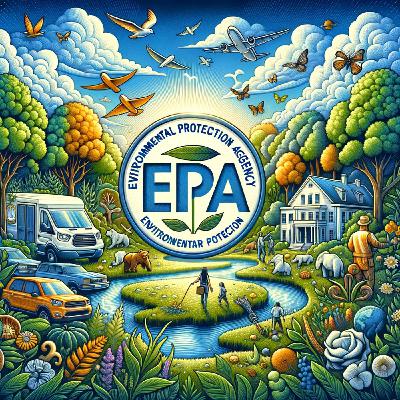EPA Shutdown Halts Regulations, Zeldin Moves to Rescind Endangerment Finding
Update: 2025-10-06
Description
The biggest headline out of the Environmental Protection Agency this week is the impact of the federal government shutdown, which began October first. Nearly ninety percent of EPA’s workforce—over thirteen thousand employees—have been furloughed. That means nationwide, routine compliance, environmental reviews, pesticide registrations, and most regulatory and permitting work have been halted or delayed. Only about seventeen hundred staff remain active for emergency response and imminent health threats, according to the LA Times and Federal News Network. Essential Superfund hazard cleanups are continuing, but the shutdown’s disruption is especially severe since the EPA had already cut about a quarter of its workforce earlier this year, shuttering its Office of Research and Development.
At the same time, massive policy changes are underway. EPA Administrator Lee Zeldin announced the largest deregulatory effort in the agency’s history, with the EPA formally proposing to rescind the Obama-era Endangerment Finding that classified greenhouse gases as a threat to public health. Administrator Zeldin said, “We are taking historic action to remove unnecessary burdens on American industry and unleash American energy.” If the proposal is finalized, it would repeal greenhouse gas emission standards for vehicles, industrial sites, and power plants, rolling back rules that had been in place for over a decade. The EPA is soliciting public comment on these changes until December first.
For coal-fired power plants, the EPA also extended the deadline for making key compliance or shutdown decisions. Plants now have until the end of 2031—six years longer than previously required—to decide if they will convert, retire, or meet stricter pollution controls under the Clean Water Act’s Effluent Limitation Guidelines. The EPA also opened a new comment period for proposed changes to the Regional Haze Rule that governs air quality in national parks and wilderness areas.
These developments have immediate impacts. For American families, the ability to enforce air and water protections is severely reduced during the shutdown, possibly slowing cleanup of hazardous sites or reviews of chemicals. For businesses, particularly in energy, chemicals, and agriculture, there is regulatory uncertainty and delays in approvals or compliance actions. State and local governments may struggle to fill the gap on oversight and public health monitoring. National environmental organizations warn that rescinding the Endangerment Finding could undermine decades of climate policy and stymie long-term health protections. Within the international community, the U.S. is signaling a major departure from its recent leadership on climate action.
You can get involved by submitting comments on EPA’s proposed regulatory rollbacks, especially if you have expertise or experience with local environmental impacts; links to comment portals are available on the EPA’s website. With deadlines for public feedback approaching in early December, now is the time for your voice to count.
Looking ahead, watch for ongoing court challenges to these sweeping regulatory shifts, more updates on the government shutdown, and fresh EPA guidance about how essential services may continue. For up-to-date alerts and details, check out epa dot gov or your local EPA regional office.
Thanks for tuning in. Be sure to subscribe for the latest updates. This has been a Quiet Please production, for more check out quiet please dot ai.
For more http://www.quietplease.ai
Get the best deals https://amzn.to/3ODvOta
This content was created in partnership and with the help of Artificial Intelligence AI
At the same time, massive policy changes are underway. EPA Administrator Lee Zeldin announced the largest deregulatory effort in the agency’s history, with the EPA formally proposing to rescind the Obama-era Endangerment Finding that classified greenhouse gases as a threat to public health. Administrator Zeldin said, “We are taking historic action to remove unnecessary burdens on American industry and unleash American energy.” If the proposal is finalized, it would repeal greenhouse gas emission standards for vehicles, industrial sites, and power plants, rolling back rules that had been in place for over a decade. The EPA is soliciting public comment on these changes until December first.
For coal-fired power plants, the EPA also extended the deadline for making key compliance or shutdown decisions. Plants now have until the end of 2031—six years longer than previously required—to decide if they will convert, retire, or meet stricter pollution controls under the Clean Water Act’s Effluent Limitation Guidelines. The EPA also opened a new comment period for proposed changes to the Regional Haze Rule that governs air quality in national parks and wilderness areas.
These developments have immediate impacts. For American families, the ability to enforce air and water protections is severely reduced during the shutdown, possibly slowing cleanup of hazardous sites or reviews of chemicals. For businesses, particularly in energy, chemicals, and agriculture, there is regulatory uncertainty and delays in approvals or compliance actions. State and local governments may struggle to fill the gap on oversight and public health monitoring. National environmental organizations warn that rescinding the Endangerment Finding could undermine decades of climate policy and stymie long-term health protections. Within the international community, the U.S. is signaling a major departure from its recent leadership on climate action.
You can get involved by submitting comments on EPA’s proposed regulatory rollbacks, especially if you have expertise or experience with local environmental impacts; links to comment portals are available on the EPA’s website. With deadlines for public feedback approaching in early December, now is the time for your voice to count.
Looking ahead, watch for ongoing court challenges to these sweeping regulatory shifts, more updates on the government shutdown, and fresh EPA guidance about how essential services may continue. For up-to-date alerts and details, check out epa dot gov or your local EPA regional office.
Thanks for tuning in. Be sure to subscribe for the latest updates. This has been a Quiet Please production, for more check out quiet please dot ai.
For more http://www.quietplease.ai
Get the best deals https://amzn.to/3ODvOta
This content was created in partnership and with the help of Artificial Intelligence AI
Comments
In Channel





